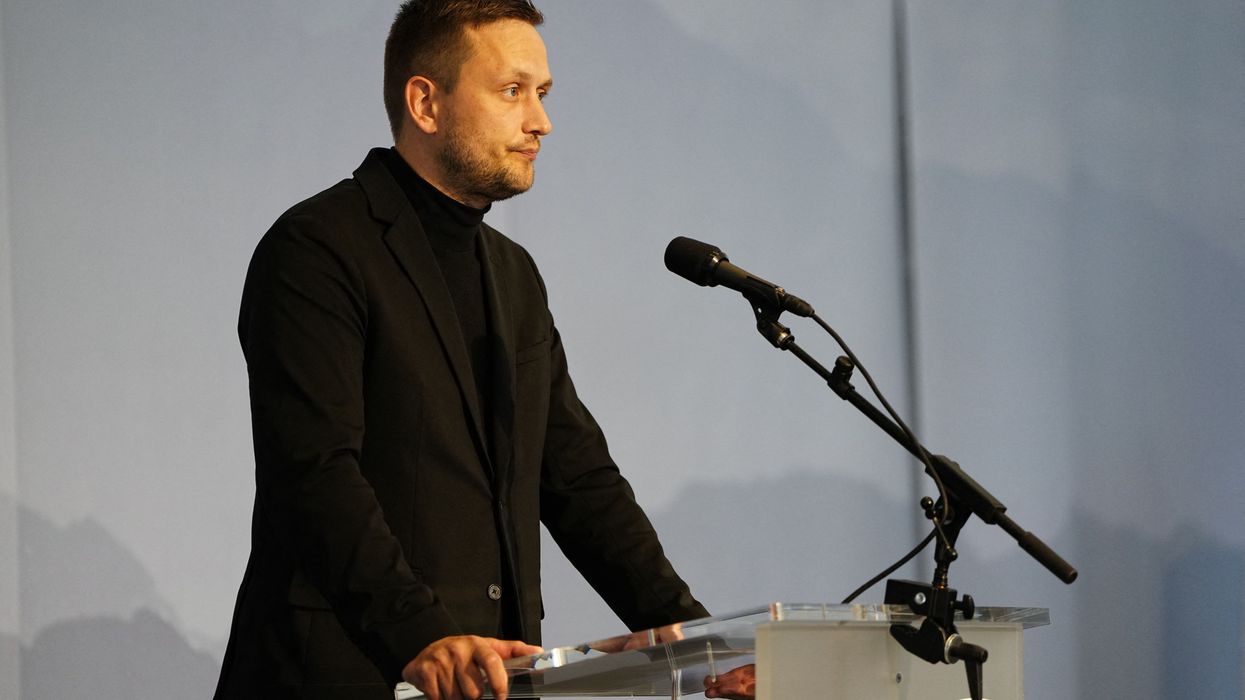April, 10 2009, 03:02pm EDT
PBS Ombud Sides with Frontline Critics
WASHINGTON
PBS ombud Michael Getler is siding with critics of a Frontline
documentary that failed to examine single-payer national health
insurance as a possible alternative to the U.S. healthcare system.
Citing FAIR's study "Media Blackout on Single-Payer Healthcare," which documented that single-payer advocates were all but shut out of the media discussion about healthcare reform, Getler stated:
I find myself in agreement with those who wrote initially and who felt it was a missed opportunity by Frontline
to shed some light on where this specific idea - clearly telegraphed in
the previous program about how other countries do it, enjoying some
level of popular and professional support and formalized in a bill
before Congress - stood in today's political environment.
to shed some light on where this specific idea - clearly telegraphed in
the previous program about how other countries do it, enjoying some
level of popular and professional support and formalized in a bill
before Congress - stood in today's political environment.
The only alternative to the current U.S. healthcare system that was examined in any depth in Sick Around America was Massachusetts' system of mandating that people buy insurance from for-profit health insurance companies. FAIR had criticized the film for misrepresenting the findings of Frontline's earlier documentary, Sick Around the World
(4/15/08), which had emphasized that all other countries ban insurance
companies from making a profit on basic care, and had discussed single
payer alternatives including Taiwan's healthcare system.
Today, FAIR's radio program CounterSpin airs an interview with T. R. Reid--a Frontline reporter for Sick Around the World who quit the production of Sick Around America because it contradicted the earlier Frontline documentary.(Audio file available at: https://www.fair.org/index.php?page=3758).
FAIR, the national media watch group, has been offering well-documented criticism of media bias and censorship since 1986. We work to invigorate the First Amendment by advocating for greater diversity in the press and by scrutinizing media practices that marginalize public interest, minority and dissenting viewpoints.
LATEST NEWS
Decimated by Tariffs, US Farmers Warn Trump Bailout Not Nearly Enough to Erase Pain He Caused
"The average soybean acre in the United States this year is going to lose $109 an acre, and that's well over two dollars a bushel," said one farmer. "It's bloody."
Dec 22, 2025
President Donald Trump has announced a $12 billion relief package for US farmers hurt by his global trade war, but there are already signs that it will be woefully insufficient.
The Guardian reported on Monday that many US farmers are concerned that the bailout offered by the Trump administration won't come close to making up for the damage done by Trump's tariffs over the last nine months.
The report cited data from the American Farm Bureau showing that US crop farmers have collectively lost $34.6 billion this year, a total that is nearly three times the size of Trump's farm aid proposal.
Dan Wright, president of the Arkansas Farm Bureau, told the Guardian that Trump's plan is both too little to make up for lost sales and too late to prevent many farms from going under.
"A program that provides roughly $50 an acre will not save the thousands of family farms that will go bankrupt before the end of the year," Wright explained.
The Guardian noted that farms in Arkansas are expected to be hit particularly hard by bankruptcies this year, although farmers across the US report being under duress.
Ohio Capital Journal reported last week on new data from the Atlantic Council’s Tariff Tracker showing that Ohio farmers lost $76 million worth of exports to China this year after the Chinese government cut off all US soy purchases in retaliation for Trump restarting his trade war.
A Monday report from the Times-Picayune quoted Louisiana Commissioner of Agriculture and Foresty Mike Strain saying recently that roughly half of Louisiana farmers "are facing significant challenges" in which they're dealing not only with lost sales to foreign nations, but also increased costs for supplies and equipment thanks to Trump's tariffs.
"The cost has gone up, but the price the farmers receive went down," Strain explained.
Kentucky farmer Caleb Ragland, chairman of the American Soybean Association, told Spectrum News 1 on Monday that soy farmers were bracing for major losses from their crops as they get hit from both sides by depressed soy prices and increased input costs.
"The average soybean acre in the United States this year is going to lose $109 an acre, and that's well over two dollars a bushel," Ragland explained. "It's bloody."
While China recently pledged to start buying more soy from US farmers, the country has been gradually increasing its reliance on Brazil and other countries so that it no longer has to deal with unpredictable US trade policies.
Andrew Muhammad, a professor of agricultural policy at the University of Tennessee, said in an interview with local public radio station WPLN that China's shift toward Latin American markets means it is no longer held hostage to Trump's whims, and it can now ensure a steady supply of soy regardless of the US president's tariff policies.
Keep ReadingShow Less
‘You Cannot Annex Other Countries’: Greenland, Denmark Furious at Trump Special Envoy Appointment
Louisiana Gov. Jeff Landry's new title "changes nothing for us at home," said the leader of Greenland. "We decide our future ourselves."
Dec 22, 2025
The leaders of Denmark and Greenland have rejected President Donald Trump's plans to take control of the latter country "very clearly before," said Danish Prime Minister Mette Frederiksen and Greenlandic Premier Jens-Frederik Nielsen on Monday, but they were forced to make their resolve even more explicit after the US leader appointed a new special envoy to the autonomous Arctic island territory.
"National borders and the sovereignty of states are rooted in international law," said Frederiksen and Nielsen in a joint statement Monday. "You cannot annex other countries... Greenland belongs to the Greenlanders, and the US should not take over Greenland. We expect respect for our common territorial integrity.”
The two leaders spoke out after Trump announced his appointment of Republican Louisiana Gov. Jeff Landry as envoy to Greenland, with both men referencing plans to take control of the country of 57,000 people, which is part of the Danish kingdom.
"Jeff understands how essential Greenland is to our National Security, and will strongly advance our Country’s Interests for the Safety, Security, and Survival of our Allies, and indeed, the World," said the president Sunday evening.
Landry replied that it is "an honor to serve you in this volunteer position to make Greenland a part of the US."
While joining Frederiksen in forcefully rejecting any plans for an annexation of Greenland, Nielsen also dismissed Landry's new role in another statement.
“It may sound big," said Nielsen of the Trump administration's latest overtures. "But it changes nothing for us at home... We decide our future ourselves."
Trump has pushed for a takeover of Greenland since his first term in the White House, and he has ramped up efforts this year since returning to office. In August, Danish Foreign Minister Lars Løkke Rasmussen summoned Mark Stroh, the US chargé d'affaires in Denmark, after the country's public broadcaster reported that the Trump administration had launched a covert "influence" campaign to sew discord between Denmark and Greenland.
Earlier this year, polling showed that 85% of Greenlanders opposed joining the US. Hundreds of people protested in Greenland's capital, Nuuk, in March, ahead of US Vice President JD Vance's visit to the country.
Greenlandic photographer Orla Joelsen said Monday that should Landry come to the country, "he will be welcomed by a massive demonstration—larger than the one we held back in March this year."
The White House has said the US should take control of the mineral-rich island for "national security and even international security." According to the US Geological Survey, the Arctic holds 13% of undiscovered oil resources and 30% of undiscovered gas. The climate emergency and melting Arctic ice has also expanded the use of the northern ocean for trade shipping routes, and controlling Greenland would give the US a greater claim in the region.
Trump has threatened to use military action to seize Greenland, saying in March that the White House would "go as far as we have to” to take ownership of the island.
On Monday, Rasmussen told the press he plans to summon the US ambassador to Denmark, Ken Howery, to the European country to demand "an explanation" of Landry's appointment.
Rasmussen said Landry's statement about Greenland was "completely unacceptable."
“As long as we have a kingdom in Denmark that consists of Denmark, the Faroe Islands, and Greenland, we cannot accept that there are those who undermine our sovereignty," he said.
European Commission chief Ursula von der Leyen and European Council President Antonio Costa expressed "full solidarity" with Denmark and Greenland on Monday, calling territorial sovereignty "fundamental principles of international law."
"These principles are essential not only for the European Union," they said, "but for nations around the world."
Keep ReadingShow Less
Trump Continues 'War Against Renewables' With Halt of Five Offshore Wind Farms
"Trump is killing jobs, raising energy costs, and harming the planet," said Sen. Tim Kaine. "Grinch!"
Dec 22, 2025
The Trump administration's efforts to thwart a transition from climate-wrecking fossil fuels to renewable energy continued on Monday with a halt on five wind farms along the US East Coast under the guise of national security concerns.
The US Department of the Interior announced that it is immediately pausing Coastal Virginia Offshore Wind off Virginia, Empire Wind 1 and Sunrise Wind off New York, Revolution Wind off Rhode Island and Connecticut, and Vineyard Wind 1 off Massachusetts, citing unclassified government reports that "the movement of massive turbine blades and the highly reflective towers create radar interference called 'clutter.'"
Bloomberg reported Monday that "President Donald Trump has long opposed offshore wind power and began imposing restrictions on it within hours of taking office this year. The policies have led to numerous court battles, and a federal judge this month ruled his ban on projects was illegal. Citing national security issues may be a more legally durable way to keep wind turbines out of US waters."
"Offshore wind farm projects raised national security concerns under previous administrations, too. The Defense Department under former President Joe Biden pushed successfully for changes to leases being sold along the West Coast to address some of the issues," Bloomberg noted. Elsewhere, such as in the United Kingdom, government and industry have responded to radar interference issues by investing in mitigation technologies.
Responding to the news on social media, American anthropologist and journalist Scott Carney said that "shutting down wind farms in the name of national security only proves that Trump is a national security risk. Lying that climate change doesn't exist is not an effective policy against environmental collapse."
Jonathan Cohn, political director of the grassroots group Progressive Mass, pointed out that "if these were oil drilling projects being canceled, Republicans would scream that canceling the project was theft from the company. If renewable energy is canceled, those same Republicans cheer."
Dean Baker, senior economist at the Center for Economic and Policy Research, warned that "any company would be crazy to invest a dime in Donald Trump's America... The jerk can confiscate property any time he wants for any reason he invents."
According to the New York Times: "Vineyard Wind 1 is currently under construction and partially operational, with about half of the project's 62 turbines sending power to the electric grid as of October. Once complete, the project could produce enough electricity to power 400,000 homes."
Congressman Greg Stanton (D-Ariz.) declared that "wind farms are an essential part of a diversified energy strategy. Trump's cancellation of approved, in-progress projects wastes public dollars and widens the gap between America and its competitors."
Rep. John Larson (D-Conn.), whose constituents would benefit from the Revolution Wind project, said that "the president has taken an axe to wind energy, solar projects, and our state's clean hydrogen sector, putting hundreds of people out of work and saddling households across the state with even higher electricity bills. The state of Connecticut, led by Attorney General William Tong, already took him on to halt his illegal stop work order before, and we're prepared to do it again."
Sen. Tim Kaine (D-Va.) said: "Trump is killing jobs, raising energy costs, and harming the planet. Grinch!"
Senate Majority Leader Chuck Schumer (D-NY) similarly responded: "Donald Trump is trying AGAIN to kill thousands of good-paying union jobs and raise your electricity bill. I have been fighting Trump's war against offshore wind—a war that threatens American jobs and American energy. I will keep fighting to make sure these projects, the thousands of jobs they create, and the energy they provide can continue."
Sierra Club legislative director Melinda Pierce said in a statement that "blocking construction on all offshore wind projects underway in the US is an attack on our economy and our public health. The Trump administration's vengeance towards renewable energy knows no end."
"Instead of progressing us forward as a nation, they are obsessed with attacking a growing industry that provides good clean energy jobs and affordable, clean electricity," she added. "Americans need cheaper and more reliable energy that does not come at the expense of our health and futures."
Interior Secretary Doug Burgum discussed the decision on Fox Business Monday, pointing to the radar interference concerns.
Noting the appearance, writer and filmmaker Lee West said: "So 'national security' means suspending wind farms Navy approved for years—while drilling rigs multiply off Florida. The [administration's] pretexts grow taller than turbine blades."
Keep ReadingShow Less
Most Popular


